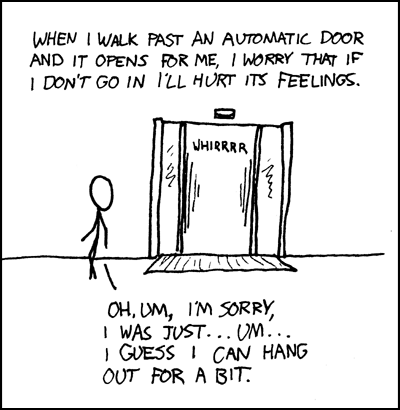Difference between revisions of "175: Automatic Doors"
(→Explanation) |
(→Explanation) |
||
| Line 8: | Line 8: | ||
==Explanation== | ==Explanation== | ||
| − | + | [[Cueball]] has an uneasy suspiction that the automatic doors may have feelings, possibly due to their apparent sentience. This assigning of human characteristics to non-human things such as the doors is called {{w|anthropomorphism}}. Cueball extends the premise that the doors having feelings to those feelings being hurt by his not entering the opened doors. This is analogous to the social faux pas of ignoring someone who has waved to you, or purposefully failing to acknowledge someone who is trying to get your attention. | |
| − | The | + | The anthropomorphized doors are much like those in the starship Heart of Gold in Douglas Adams' ''{{w|Hitchhiker's Guide to the Galaxy}}''. In the story, the characters find a brochure describing the ship, which states that "All the doors in this spaceship have a cheerful and sunny disposition. It is their pleasure to open for you, and their satisfaction to close again with the knowledge of a job well done." Such doors would not be given the "satisfaction" of the "knowledge of a job well done" if the figure passes close enough to trigger the doors, but does not actually go through them. |
In the title text it is revealed that Cueball has made the acquaintance of a number of automatic doors, and possibly hung out with them only because he doesn't want to hurt their feelings. His being embarassed about hurting the feelings of any automatic doors who happen to read the comic and thus find out that what they thought was a genuine friendship was only Cueball trying not to hurt their feelings, in fact should more likely be embarrassment over making friends with mechanical doors who he believes have feeling which can be hurt in the first place. | In the title text it is revealed that Cueball has made the acquaintance of a number of automatic doors, and possibly hung out with them only because he doesn't want to hurt their feelings. His being embarassed about hurting the feelings of any automatic doors who happen to read the comic and thus find out that what they thought was a genuine friendship was only Cueball trying not to hurt their feelings, in fact should more likely be embarrassment over making friends with mechanical doors who he believes have feeling which can be hurt in the first place. | ||
Revision as of 22:41, 7 November 2014
| Automatic Doors |
 Title text: I hope no automatic doors I know read this. I would be so embarrassed. |
Explanation
Cueball has an uneasy suspiction that the automatic doors may have feelings, possibly due to their apparent sentience. This assigning of human characteristics to non-human things such as the doors is called anthropomorphism. Cueball extends the premise that the doors having feelings to those feelings being hurt by his not entering the opened doors. This is analogous to the social faux pas of ignoring someone who has waved to you, or purposefully failing to acknowledge someone who is trying to get your attention.
The anthropomorphized doors are much like those in the starship Heart of Gold in Douglas Adams' Hitchhiker's Guide to the Galaxy. In the story, the characters find a brochure describing the ship, which states that "All the doors in this spaceship have a cheerful and sunny disposition. It is their pleasure to open for you, and their satisfaction to close again with the knowledge of a job well done." Such doors would not be given the "satisfaction" of the "knowledge of a job well done" if the figure passes close enough to trigger the doors, but does not actually go through them.
In the title text it is revealed that Cueball has made the acquaintance of a number of automatic doors, and possibly hung out with them only because he doesn't want to hurt their feelings. His being embarassed about hurting the feelings of any automatic doors who happen to read the comic and thus find out that what they thought was a genuine friendship was only Cueball trying not to hurt their feelings, in fact should more likely be embarrassment over making friends with mechanical doors who he believes have feeling which can be hurt in the first place.
Transcript
- When I walk past an automatic door and it opens for me, I worry that if I don't go in I'll hurt its feelings.
- whirrrr
- Cueball: Oh, um, I'm sorry, I was just... um... I guess I can hang out for a bit.
Discussion
I Think he should have given DNA credit somehow. ([[User talk: |talk]]) (please sign your comments with ~~~~)
Glad to be of Service. ! 108.162.249.205 05:57, 22 August 2014 (UTC)
The concept of intelligent doors with hurt feelings has previously been explored in the series Red Dwarf and The Hitchhikers Guide to the Galaxy. ([[User talk: |talk]]) (please sign your comments with ~~~~)
